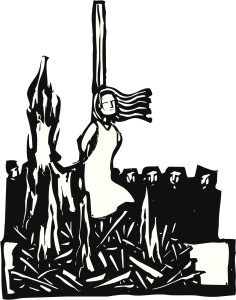
Many Americans are familiar with the Salem Witch Trials of the 17th century through their history classes or from reading “The Crucible” in English classes. In 1996, a film adaptation of the Arthur Miller play was released. It starred Wynona Ryder and Daniel Day-Lewis, and it brought the incident back into vogue, so to speak. The Salem witch trials have become synonymous with mass hysteria and religious extremism. The time period is one of the most fascinating eras in America’s history, and it still is brought up in political rhetoric today. Today, Americans are much more tolerant of other people’s faiths and beliefs, which makes the murder of a Wiccan practitioner in New Mexico so surprising.
The Victim
Roxanne Houston had lived in Colorado Springs until 2013, when she left to go to Carson, New Mexico. In the reports following her murder, it was noted that she was bi-polar and practiced Wicca. Her four children had all been adopted by other parents because Houston’s life was co complicated and unstable. Her ex-husband posted on Facebook that he had much affection for her, but they had problems living together. He wished he could have helped her. Houston camped in Carson for a while, then moved into a home where she lived until her death. She disappeared in July 2014.
It would take six months for Houston’s body to be found. Two hikers were walking with their dogs when one of the canines started rolling around on something on the ground. The hikers contacted the police, who then launched the investigation. Her body was discovered in December, and in February 2015, the police arrested Dennings Cales Jr., who had been living in the same house as Houston. There are some indications that Cales and Houston might have been in a love triangle.
During the trial, Cales was portrayed as a Native American “survivalist” who claimed to be on a witch-hunt to kill all Wiccans. Testimony was given that reported that Cales believed he would have to kill any Wiccan who put a spell on him. His lawyers did attempt to get all the testimony about witchcraft removed from the case, but the judge denied the motion. The DA made it clear that the theories about the witch-hunt and the love triangle were theories, but he and his staff were positive that Cales was the killer.
Justice for Houston
It took the jury just four hours of deliberation to find Cales guilty of the murder of Houston. Cales is waiting for his sentence, but Houston did find justice in the end. One lingering issue that has many concerned is that Houston’s death was not labeled a hate crime. Witches and other minorities often find themselves victims of violence and aggression.
The Salem Witch Trials have not been the only time when Pagans and Wiccans were targeted because of misinformation. In the late 20th century, there were a number of attacks on the Satanic community, many of which were unfounded. These cases alleged abuse in satanic rituals, and the phenomenon was not limited to the United States. Christian fundamentalists propagated the attacks in Australia, Canada, the UK, and South Africa. Although some of the incidents were related to satanic ritual events, these were isolated and not sanctioned by leaders in the faith. However, mass hysteria ensued.
To help people deal with hate crimes, Ardantane Learning Center in Jemez Springs, New Mexico, is offering an online workshop to discuss hate crimes against the Pagan community. We have to remember and study history to change the future. Maybe that’s why the Salem Witch Trials are so ingrained into America’s culture. It was a dark time that no one wants to see happen again. Although we can’t prevent extremists from committing crimes, we can educate people about Pagan religions.

